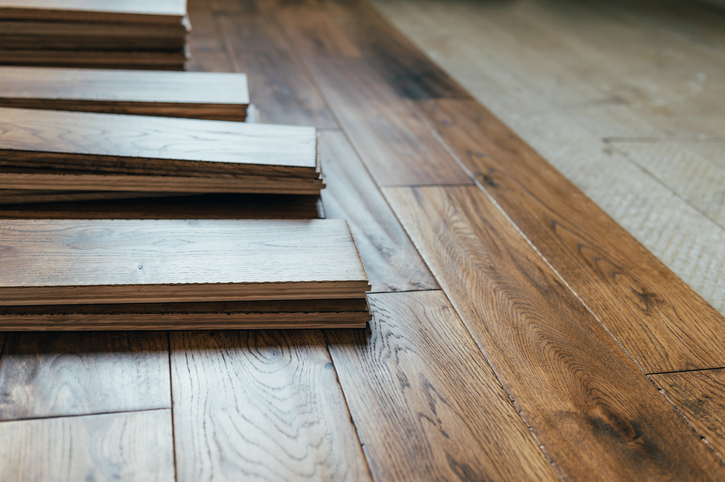
Choosing the most adequate hardwood for a home involves several very important decisions-first and foremost, whether to go with engineered hardwood or solid hardwood. Both options incorporate classic beauty and timeless appeal into one’s space, but the two differ in their composition, installation options, and performance in various environments.
Let’s dive into the key differences between engineered hardwood and solid hardwood to help you determine which option is best suited for your lifestyle, budget, and home environment.
What is Solid Hardwood?
Solid Hardwood: The name itself says it all-something like planks of hardwood milled from a single piece of wood. It is a highly vintage type of flooring which is highly prized because it is original, durable, and its refinishing can be done several times. Solid hardwood commonly comes as ¾-inch-thick planks and has been highly valued for a long period due to strength and durability.
Key Benefits of Solid Hardwood:
- Durability: Solid Hardwood is considered to be very durable and can last a lifetime with good maintenance.
- Refinishing: Because it is made all from one single piece of wood, solid hardwood can be sanded and refinished many times, which prolongs its serving life and allows the house owner to renew his or her floor’s look at any time.
- Timeless Aesthetic: Solid hardwood portrays a classic charm of natural wood, beauty that is timeless. Each plank is one of a kind and showcases the natural beauty along with grain patterns of the wood.
Best for:
- Homes where durability has to be the top priority.
- Homeowners who want to refinish their floors multiple times over the years.
- Above-grade spaces are those such as living rooms, bedrooms, and dining rooms where the moisture would be less of an issue.
What is Engineered Hardwood?
Engineered hardwood is a product made from a thin layer of actual hardwood veneer that is glued onto multiple layers of plywood or high-density fiberboard. Because of such construction, engineered hardwood is far more resistant to humidity and temperature fluctuations than solid hardwood. Engineered hardwood is, by its very nature, very stable. It can be installed in places where conditions may not be as ideal, such as basements or over radiant heating systems.
Key Benefits of Engineered Hardwood:
- Moisture Resistance: Engineered hardwood has a layered construction, reducing its tendency to warp or expand when exposed to moisture and humidity. It is, therefore, more appropriate for basements, kitchens, and bathrooms-the places where solid hardwood usually does not fit.
- Versatility in Installation: Engineered hardwoods can be installed in more ways, either by floating, gluing, or nailing down. It gives the owner more options than solid hardwoods.
- Affordability: Engineered requires far less raw material in its making; this generally makes it less expensive than solid hardwood, at no sacrifice in appearance and experience to the user of real wood.
Best for:
- Homes in which humidity levels tend to fluctuate considerably or those that are prone to moist conditions.
- Basements, kitchens, or bathrooms where moisture may be the problem.
- Homeowners looking to save money, but not wanting to compromise on the aesthetic delivered by natural wood.
Engineered Hardwood vs. Solid Hardwood: Key Differences
1. Durability and Longevity
Of the two, solid hardwood tends to be longer lasting, though both solid and engineered hardwood represent tough options. Solid hardwood can be sanded and refinished several times throughout its life to easily make it last for decades, if not well over a century. Engineered hardwood has a thin veneer surface layer, which means it can only be refinished a limited number of times depending on the thickness of the top layer.
- Solid Hardwood: Can be refinished numerous times over and can last for decades.
- Engineered Hardwood: Can be refinished 1-2 times depending on the top veneer thickness, which is still durable.
2. Resistance to Moisture and Humidity
For this reason, engineered hardwood is manufactured to be more stable when moisture and humidity fluctuate, and it is less apt to warp or buckle. This makes it a whole lot more suitable for places like basements or rooms with radiant heating. Solid hardwood is incredibly resistant but tends to be sensitive to humidity and moisture changes; this too often results in warping or gapping between the boards over time.
- Solid Hardwood: More sensitive to expansion and contraction in moist conditions.
- Engineered Hardwood: It is more resistant to moisture and high humidity, unlike solid hardwoods.
3. Installation Flexibility
One of the major advantages of engineered hardwood has to do with its flexibility in installation. Engineered hardwood can employ three methods of installation: floating, glue-down, and nail-down installation. This allows it to be applied over a wide range of subfloors-from concrete to radiant heating systems. Solid hardwood installation must be over a plywood subfloor and by nail-down; hence, it is very limited in its applications.
- Solid Hardwood: Requires nail-down installation and is best suited for above-ground rooms.
- Engineered Hardwood: Can be installed using various methods, making it more flexible in terms of location and subfloor types.
4. Cost
The only other factor, aside from that, is cost. In general, solid hardwoods will cost a bit more since one plank contains more raw wood. Generally speaking, engineered hardwoods are a little easier on the budget, especially for those really nice fancy woods that you may not be able to afford in solid form. Both options can range greatly in price depending on the type of wood, thickness, and brand.
- Solid Hardwood: Generally more expensive due to the use of raw wood.
- Engineered Hardwood: Often more affordable and available in a broader range of prices.
5. Environmental Impact
If you’re hung up on sustainability, then both solid and engineered wood can be green-depending on where the wood is sourced. In this regard, engineered hardwood requires less raw material than solid hardwood, making it more viable for those homeowners who remain concerned about their environmental footprint. Home owners can take it one step further by making sure the woods they go with are certified via an organization like the FSC, which verifies that the wood was responsibly sourced.
- Solid Hardwood: Uses more raw wood, but can be sourced sustainably.
- Engineered Hardwood: More eco-friendly due to the use of less hardwood per plank.
Which Hardwood Flooring is Right for You?
Ultimately, the decision between engineered hardwood and solid hardwood has to be taken by the homeowner, based on personal choice, lifestyle, budget, and environmental conditions. Here is a quick guide that might be of help:
- Choose Solid Hardwood if:
- You’re looking for a floor that can be refinished multiple times.
- You want a traditional hardwood look and feel.
- You’re installing hardwood flooring in areas with stable humidity and moisture levels, such as living rooms and bedrooms.
- Choose Engineered Hardwood if:
- You’re installing flooring in areas prone to moisture, like basements or kitchens.
- You need a more affordable alternative to solid hardwood.
- You’re looking for versatile installation options, such as floating or glue-down methods.
Why Choose The Carpet Guys for Your Hardwood Flooring Installation?
Here at The Carpet Guys, we carry and can install both engineered and solid hardwood flooring to best suit your needs. Here’s why we are the best choice for your flooring project:
- Expert Opinion: Our experienced team will help you in finding the right choice among engineered and solid hardwood, considering your lifestyle, budget, and home environment.
- Variety: We carry a wide variety of species, color, and finish of woods to enable you to select that perfect hardwood that will suit your needs.
- Professional Installation: Our certified installers will provide flawless installation for your hardwood floors, so the beauty will last for years to come with durability.
- Lifetime Installation Warranty: We back up our work by offering clients a lifetime installation warranty for peace of mind.
Get Started on Your Hardwood Flooring Project Today
Whether engineered or solid hardwood is your preference, either option is a beautiful, timeless choice that’s never out of style. Give us a call today at 855-4-MY-GUYS, and we can arrange your free in-home flooring estimate. Allow us to help you make the perfect choice for not only your home but also your lifestyle, so you may continue enjoying your hardwood for years ahead!




